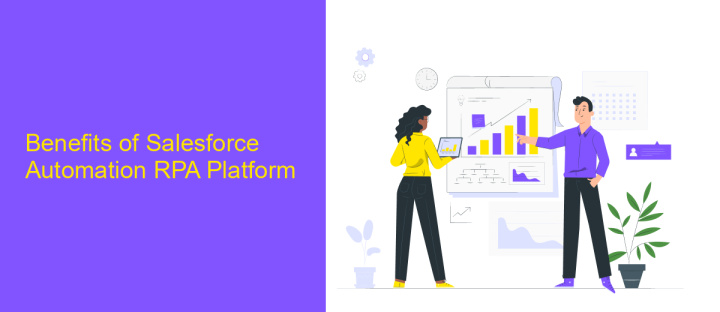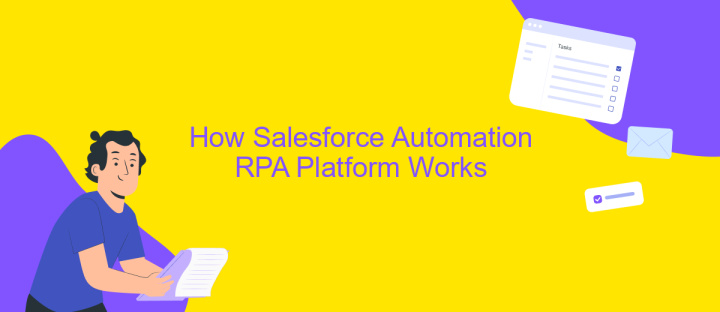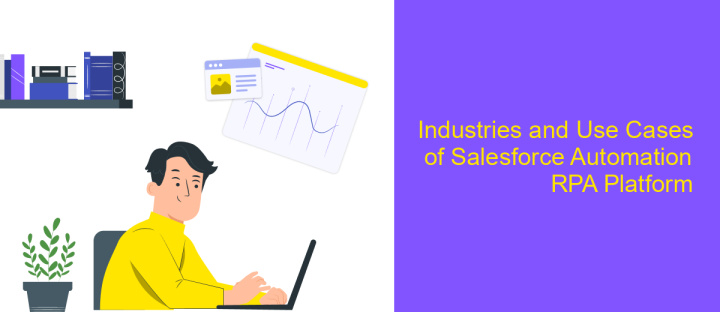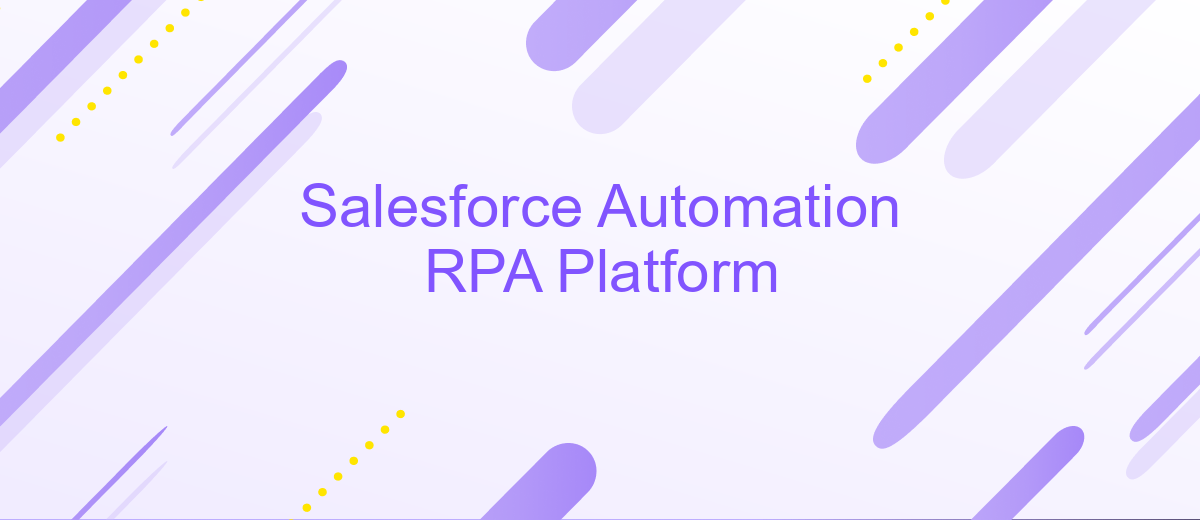Salesforce Automation RPA Platform
Salesforce Automation RPA Platform revolutionizes the way businesses manage their sales processes by integrating Robotic Process Automation (RPA) with Salesforce's robust CRM capabilities. This innovative platform streamlines repetitive tasks, enhances data accuracy, and boosts productivity, allowing sales teams to focus on building customer relationships and driving growth. Discover how Salesforce Automation RPA Platform can transform your sales operations and provide a competitive edge in today's fast-paced market.
Introduction
Salesforce Automation RPA Platform represents a pivotal advancement in the realm of business process automation. By seamlessly integrating Robotic Process Automation (RPA) with Salesforce’s comprehensive suite of customer relationship management (CRM) tools, businesses can streamline operations, enhance productivity, and improve customer engagement. This platform empowers organizations to automate repetitive tasks, allowing employees to focus on more strategic activities, thereby driving innovation and growth.
- Enhanced Efficiency: Automate mundane tasks to reduce manual effort and errors.
- Improved Customer Experience: Quickly respond to customer inquiries and provide personalized service.
- Cost Savings: Reduce operational costs by minimizing human intervention in routine processes.
In today's fast-paced business environment, leveraging automation is no longer a luxury but a necessity. The Salesforce Automation RPA Platform offers a robust solution for companies looking to optimize their workflows and stay competitive. By harnessing the power of automation, businesses can not only achieve operational excellence but also foster a culture of continuous improvement and innovation. This platform is a testament to how technology can transform business processes, leading to sustainable success.
Benefits of Salesforce Automation RPA Platform

Implementing a Salesforce Automation RPA Platform can significantly enhance operational efficiency by automating repetitive tasks, allowing employees to focus on more strategic activities. This automation leads to increased productivity, as routine processes such as data entry, report generation, and customer follow-ups are handled swiftly and accurately by robots. Moreover, the platform ensures consistency and reduces the likelihood of human errors, thereby improving overall data quality and decision-making processes.
Another key benefit is the seamless integration capabilities with various third-party applications and services. Tools like ApiX-Drive facilitate these integrations, enabling businesses to connect Salesforce with other essential software systems effortlessly. This connectivity ensures that data flows smoothly across platforms, providing a unified view of customer interactions and business operations. As a result, companies can deliver personalized customer experiences and respond to market changes more rapidly. Additionally, the scalability of Salesforce Automation RPA allows businesses to adapt and grow without the need for extensive manual adjustments, making it a future-proof solution for dynamic business environments.
How Salesforce Automation RPA Platform Works

Salesforce Automation RPA Platform streamlines business processes by integrating robotic process automation (RPA) with Salesforce capabilities. This platform automates repetitive tasks, enhances data accuracy, and improves operational efficiency. By leveraging RPA, businesses can focus on strategic initiatives rather than mundane processes, ultimately driving growth and innovation.
- Data Integration: The platform seamlessly connects with various data sources, ensuring that all information is up-to-date and accessible within Salesforce.
- Task Automation: It automates routine tasks such as data entry, report generation, and customer interactions, reducing manual effort and minimizing errors.
- Workflow Optimization: The platform enhances workflow efficiency by automating complex business processes, ensuring timely completion and adherence to compliance standards.
- Scalability: As businesses grow, the platform can easily scale to accommodate increasing volumes of data and transactions without compromising performance.
By integrating RPA with Salesforce, organizations can achieve a significant reduction in operational costs while enhancing customer satisfaction. The platform's ability to automate and optimize processes allows teams to allocate resources more effectively, focusing on core business objectives. This results in a more agile and responsive business environment, capable of adapting to changing market demands.
Industries and Use Cases of Salesforce Automation RPA Platform

Salesforce Automation RPA Platform is transforming industries by streamlining operations and enhancing productivity. This powerful tool integrates robotic process automation with Salesforce, enabling businesses to automate repetitive tasks and focus on strategic initiatives. As a result, companies can achieve greater efficiency and accuracy in their processes.
The platform is versatile and applicable across various industries, each benefiting uniquely from its capabilities. From finance to healthcare, Salesforce Automation RPA Platform addresses specific needs, ensuring tailored solutions for every sector. Its adaptability makes it an essential asset for businesses aiming to stay competitive.
- Finance: Automates data entry and compliance processes, reducing errors and saving time.
- Healthcare: Streamlines patient data management and appointment scheduling, improving service delivery.
- Retail: Enhances inventory management and customer service through automated responses.
- Manufacturing: Optimizes supply chain operations and reduces downtime with predictive maintenance.
By leveraging Salesforce Automation RPA Platform, organizations can unlock new opportunities for growth and innovation. The platform’s ability to integrate seamlessly with existing systems ensures a smooth transition to automated processes, allowing businesses to focus on their core competencies and drive success in a competitive market.


Conclusion
In conclusion, the integration of Salesforce Automation with RPA platforms represents a significant advancement in streamlining business processes and enhancing operational efficiency. By automating repetitive tasks, organizations can allocate resources more strategically, allowing employees to focus on higher-value activities that drive innovation and growth. This synergy between Salesforce Automation and RPA not only reduces operational costs but also improves accuracy and consistency across various business functions.
Furthermore, leveraging integration services like ApiX-Drive can simplify the process of connecting Salesforce with other applications, ensuring seamless data flow and communication. This enables businesses to create a more cohesive and interconnected digital ecosystem, enhancing decision-making and responsiveness to market changes. As companies continue to embrace digital transformation, the adoption of Salesforce Automation and RPA, supported by robust integration tools, will be crucial in maintaining a competitive edge and achieving long-term success.
FAQ
What is Salesforce Automation RPA Platform?
How does Salesforce RPA improve business efficiency?
Can Salesforce RPA be integrated with other applications?
What are the benefits of using Salesforce RPA for data management?
Is it necessary to have technical expertise to implement Salesforce RPA?
Time is the most valuable resource for business today. Almost half of it is wasted on routine tasks. Your employees are constantly forced to perform monotonous tasks that are difficult to classify as important and specialized. You can leave everything as it is by hiring additional employees, or you can automate most of the business processes using the ApiX-Drive online connector to get rid of unnecessary time and money expenses once and for all. The choice is yours!

